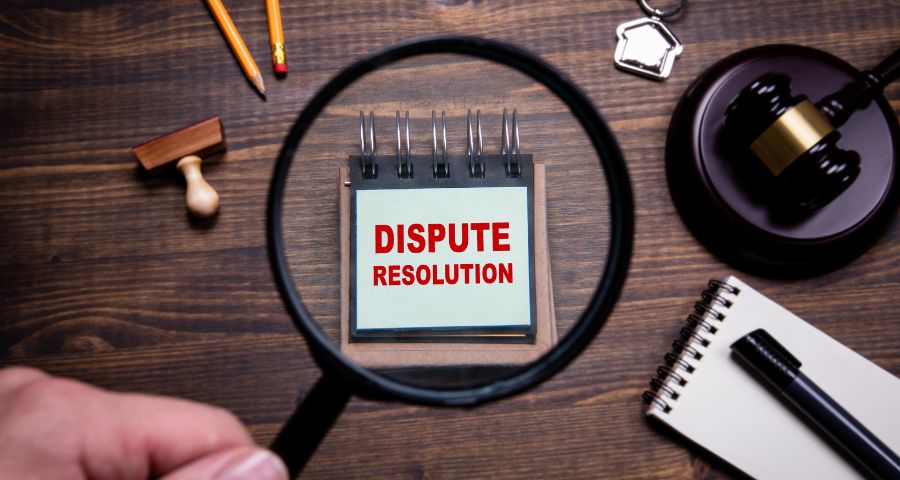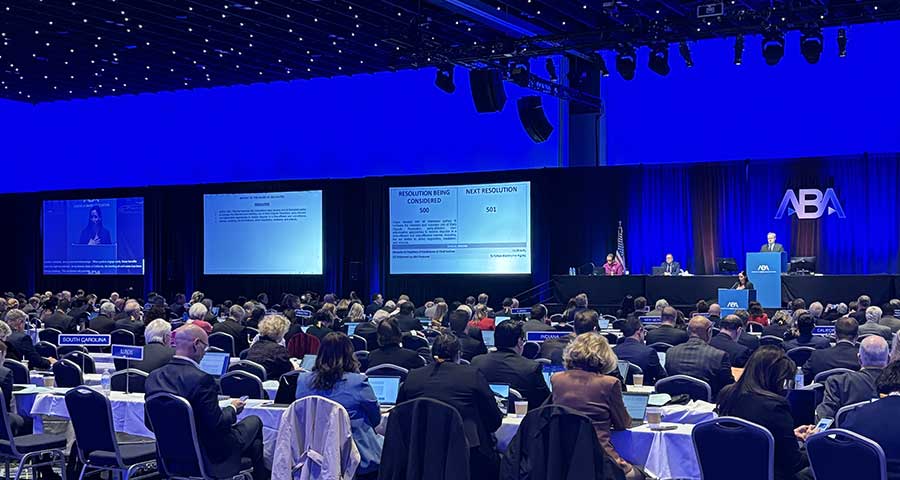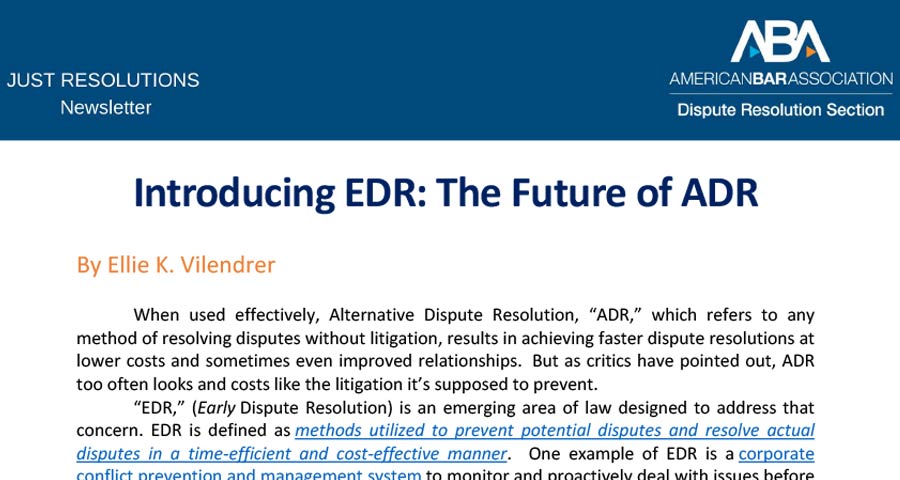
Early Dispute Resolution provides many benefits, including:
Party autonomy and self-determination. Party self-determination in dispute resolution preserves and reinforces procedural and substantive justice and also gives the parties greater sense of empowerment. “Settlement has the benefit of control. Even the most confident of counsel should remain ever heedful of the non-pecuniary benefits of settlement. Notably the client is able to control his or her or its own destiny and not leave it in the hands of an over-worked, harried judge or the vagaries of pooled strangers from all walks of life.” – Hon. Jay C. Gandhi, U.S. Magistrate Judge for the Central District of California.
Greater Certainty. Parties can dictate the timing and method of dispute resolution, reducing years of uncertainty often associated with court proceedings.
Creative Solutions. Early dispute resolution encourages problem-solving, allowing parties to explore innovative solutions beyond the confines of traditional court remedies.
Informed Decisions. A reality check of the strengths, weaknesses, and ambiguity of a case early in the litigation may help the client to develop reasonable expectations and to make better informed decisions about the course of the dispute.[1]
Cost Savings. Choosing to negotiate early puts parties in control of the process, providing more expedient and economical outcomes. Even if the parties don’t settle at an early-stage, the issues can be clarified, the future legal work focused.
Preserving Relationships. Early-stage negotiation produces results before the parties are so polarized, that settlement is difficult and the parties become combative. For parties who have to keep working together, contracting together, or are otherwise in a relationship, early dispute resolution is even more valuable.
Increasing the Availability of Judicial Resources. While not suitable for every case, early dispute resolution alleviates court congestion by resolving cases sooner, freeing up resources for more complex matters that demand greater judicial attention.
In a study, lawyers who were identified as having good reputations by their peers overwhelmingly suggested starting negotiation at the earliest appropriate time[2]. A new law in Israel which requires divorcing spouses to meet and engage in a pre-litigation process has reduced litigation in Israel by 50% in only two years.[3] Results from a 2011 survey of Fortune 1000 corporate counsel indicate that those who have had repeat experience with adjudicatory dispute resolution processes (litigation and arbitration) prefer a negotiated, versus litigated, outcome. The 2011 survey also revealed a dramatic drop in the percentage of companies that purport to “litigate first” before moving to ADR.[4]
Most parties should be able to engage in a meaningful early settlement discussion. The facts in a case are historical, capable of being learned at the outset of a dispute. In accordance with their professional responsibility duties to provide competent representation and act with reasonable diligence, at the beginning of a case, lawyers should seek to learn the spectrum of information immediately available to them (such as by interviewing their own witnesses and examining their own documents). If parties feel they are still lacking information necessary before a resolution can be reached, they can discuss the exchange of just enough information to make an informed decision.
Much discovery has little value[5] and engaging in full discovery often does not significantly improve an attorney’s ability to predict trial outcomes. In a fascinating study which included 2,054 California civil cases decided between 2002 and 2005, in 85 percent of all cases that went to trial, one or both parties were worse off by rejecting the last settlement proposal[6].
In summary, early dispute resolution stands as a cornerstone of effective and efficient legal practice, offering a multitude of advantages to parties embroiled in conflicts. From preserving autonomy and fostering creative problem-solving to enabling informed decision-making and cost savings, its benefits are manifold. Moreover, by promoting timely resolution and preserving valuable relationships, early intervention not only eases the burden on congested courts but also contributes to a more harmonious and equitable resolution process. As legal professionals continue to recognize the value of proactive engagement and information exchange in dispute resolution, the prevalence of early settlement discussions is poised to increase, paving the way for an improved justice system for all stakeholders involved.
[1] These early discussions also may reduce the risk of clients second-guessing their attorneys’ strategies if they ultimately settle after paying substantial legal fees. See the Committee Notes to Rule 3.1.1 at https://www.americanbar.org/content/dam/aba/administrative/litigation/leadership_init/council_docs/settlementnegotiations.pdf
[2] They also recommended taking charge of their cases from the outset, which includes getting a clear understanding of clients and their interests, developing good relationships with counterpart lawyers, carefully investigating the cases, making strategic decisions about timing, and enlisting mediators and courts when needed. Lande, John, Good Pretrial Lawyering: Planning to Get to Yes Sooner, Cheaper, and Better (2014). 16 Cardozo Journal of Conflict Resolution 63 (2014), University of Missouri School of Law Legal Studies Research Paper No. 2014-06, Available at SSRN: https://ssrn.com/abstract=2405625
[3] https://collaborativedivorcecalifornia.com/how-israel-substantially-reduced-litigation-in-family-court/
[4] See Mediation Advocacy: Negotiating Tips and Perspectives to Help Up Your Game at Mediation, by Rebecca Callahan, Orange County Lawyer, citing Thomas J. Stipanowich and J. Ryan Lamare, Living with ADR: Evolving Perceptions and Use of Mediation, Arbitration and Conflict Management in Fortune 1,000 Corporations, 19 Harv. Negot. L. Rev. 1 (2014), available at www.mediate.com/articles/LivingWithADR.cfm.
[5] Lande, John, Lawyering with Planned Early Negotiation, How You Can Get Good Resolutions for Clients and Make Money, Second Edition; pg. 8
[6] Journal of Empirical Studies, Volume 5, Issue 3, 551-591, September 2008, titled “Let’s Not Make a Deal: An Empirical Study of Decision Making in Unsuccessful Settlement Negotiations” by Randall L. Kiser, Martin A. Asher and Blakeley B. McShane. It can be found at www3.interscience.wiley.com/cgibin/ fulltext/121400491/pdfstart.




